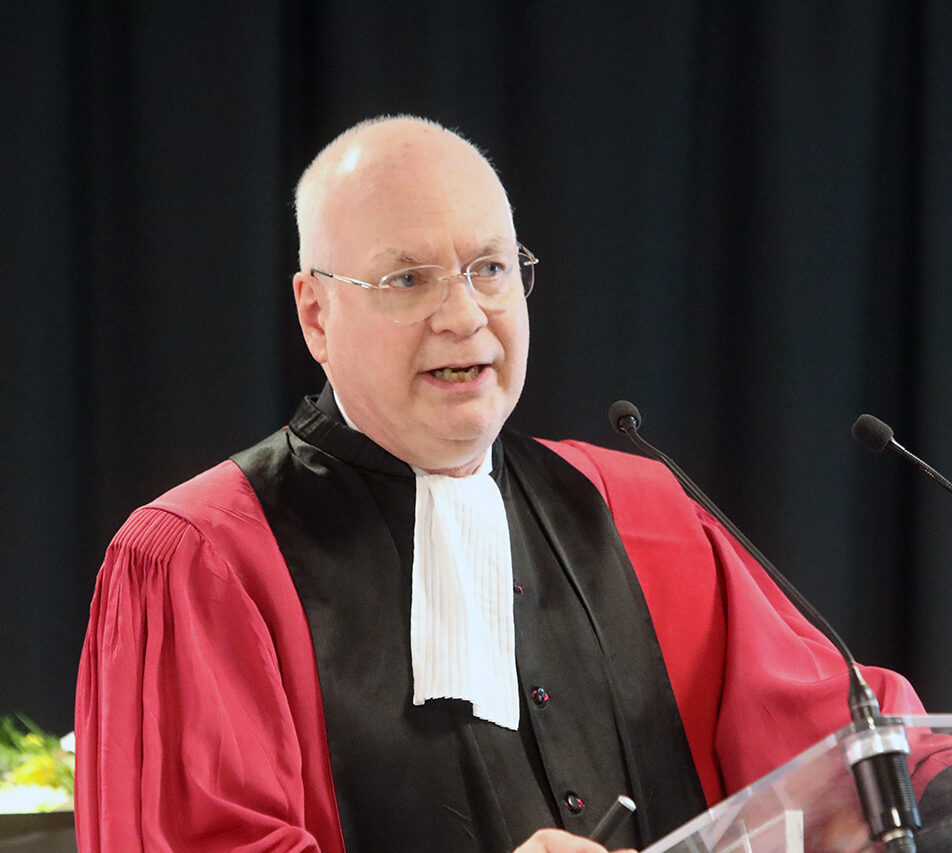Michel Bouvier: medicine that sets a precedent
A world-renowned researcher in the field of G protein-coupled receptors (GPCRs), Michel Bouvier has contributed to numerous fundamental and therapeutic discoveries on these proteins, which are the target of more than 30% of drugs on the market. Many researchers in Montpellier trained under the professor at the Faculty of Medicine of the University of Montreal. In 2023, he received an honorary doctorate from the University of Montpellier.

Philippe Marin is full of praise for Michel Bouvier. This is hardly surprising, given that Bouvier sponsored the professor from the Faculty of Medicine at the University of Montreal for an honorary doctorate from the University of Montpellier, which he received at a ceremony held on April 13 at Genopolys. "The 1990s were a fabulous time for discoveries about G proteins with promising therapeutic prospects," recalls Philippe Marin, director of the Institute of Functional Genomics (IGF). " For students like me who were working in this field, Michel Bouvier's signature was one of the three we looked for in publications."
The world-renowned researcher in the field of G protein-coupled receptors (GPCRs), proteins that play a major physiological role, is one of the most prolific of his generation. Author of more than 360 publications in leading biomedical journals such as Cell, Nature, and PNAS, his work on understanding the mechanisms of action of these receptors contributes valuable knowledge for the treatment of many diseases. GPCRs are the target of more than 30% of drugs on the market.
“A certain way of doing science”
Also serving as CEO of the Institute for Research in Immunology and Cancer (IRIC) in Montreal, Michel Bouvier combines fundamental discoveries with the development of new therapeutic compounds. For example, his team has developed molecules capable of correcting the deformation of RCPG proteins caused by genetic mutations. This deformation is responsible for certain forms of early obesity and type 2 diabetes. By restoring the shape of the protein, these molecules offer an effective treatment for these diseases.
Michel Bouvier has filed fifteen patents during his career. Some of these relate to technologies he has developed, in particular bioluminescence resonance energy transfer (BRET), which uses biosensors (created through genetic engineering) capable of emitting a light signal when they are in close proximity. This technique makes it possible to monitor cellular communication in real time, thanks to the luminescence emitted when hormones or neurotransmitters bind to GPCRs. BRET is now widely used. "Laboratories that agree to share the techniques they develop are not that common in a field as competitive as biomedical research," points out Philippe Marin. " This sharing reflects a certain way of doing science and illustrates Michel's intellectual generosity."
A real "school"
It was also because of his Canadian colleague's human qualities that Philippe Marin sponsored him: "I met him for the first time at a conference and was charmed by this highly didactic professor, who took the time to take an interest in the work of young students like me at the time. Unlike other "stars of science who produce magnificent research but then leave without showing any interest in their colleagues," Michel Bouvier has created a veritable "school" around his work. "This is how a researcher leaves a mark: through their discoveries, but also by training people who perpetuate knowledge," continues Philippe Marin.
This "school" is particularly well represented in Montpellier, where RCPGs are a key focus at several institutes, such as the IGF, the Max Mousseron Biomolecules Institute (IBMM), and the Center for Structural Biology (CBS). The directors of some of the teams at these institutes trained in Michel Bouvier's laboratory: to name but a few, Bernard Mouillac, Julie Perroy, and Sébastien Granier, who now lead teams at the IGF. And the future director of the CBS, Emmanuel Margeat, has just returned from a year there. Not to mention the many students from Montpellier who continue to train with the Montreal team.
Michel Bouvier also visits France frequently. "He is regularly invited to participate in seminars and thesis juries in Montpellier. I have counted at least six juries, and I must say that he has always accepted these invitations with enthusiasm," notes Philippe Marin. The Quebecker's love of France is certainly one of the reasons for his close collaboration with the country!
